Sarah Fine's Blog, page 7
September 19, 2012
On Boundaries and Burnout
Before I say anything else, I need to point you toward my WIDGET. No, that is not a euphemism. My friend Brigid Kemmerer made me this handy little SANCTUM countdown widget, and now I have it to stare at and watch the seconds fly by. If you would also like to stare at it, feel free to grab and post.
NOW ... as you probably know, writing is not my only job. I still psychologize (though on fewer days than before my writing career began to gobble up everything else). In fact, I direct something called the Center for Community Based Services at my agency, and that means I supervise staff and do all sorts of other training/consulting/meeting type things.
I have the best staff in the world. They are simply the most dedicated, thoughtful, vibrant bunch of people I've ever worked with. Their jobs are difficult--we provide intensive home- and community-based behavioral health services to families with kids who are at high risk for psychiatric hospitalization or for incarceration. It's a job that entails a definite element of physical risk--some staff members have been assaulted by clients who were having a particularly hard time. But the job also comes with emotional risk, and last week we all met to discuss that a bit.
In our weekly staff meeting, we talked about burnout, and what causes it. Staff listed a lot of things that could lead to burnout--not taking good care of themselves, dealing with uncertainty, not seeking or accepting help and support from colleagues and supervisors ... but they also came up with this: not having healthy boundaries.
 Not having healthy boundaries can lead to burnout.
Not having healthy boundaries can lead to burnout.
And as I thought about it, I realized that is true for many professions, not just for those in the mental health field. It's also true for writers. Here are some ways unhealthy boundaries can manifest:
No feeling able to say NO. To a request for a beta-read or critique. To a guest blog post. To a co-authored project. To a promotional or other group project.
Always being ON. The demands of social media are 24/7. Content content content. Interaction interaction interaction. Now now now. It's difficult to unplug, but what are the consequences for being ... plugged? All the time?
Too much self-disclosure. Really, it's easy to live life online. You can tell others your deepest, darkest secrets and feelings with a series of keystrokes, never having to look them in the eye. And sometimes, disclosure is pure and honest and brave and therapeutic. But sometimes, when the potential risks are not thought through, it leaves a person quite vulnerable and can lead to regret and ongoing feelings of anxiety and victimization. Despite this risk, there's a significant amount of pressure to get personal, I think. It often feels good in the moment, and it's often reinforced by others, which leads to more, and more personal, disclosure. I think the amount of disclosure that's "right" totally depends on the individual and how he/she handles it, but when the balance is off, burnout is a risk.
On Monday, I'll talk about how I manage this personally (and imperfectly) as I get ready for the publication of my first novel.
For now, I think I'll take a breath and ask YOU to weigh in! How do you think about boundaries? How do you maintain them? Are here other ways unhealthy boundaries can manifest?
NOW ... as you probably know, writing is not my only job. I still psychologize (though on fewer days than before my writing career began to gobble up everything else). In fact, I direct something called the Center for Community Based Services at my agency, and that means I supervise staff and do all sorts of other training/consulting/meeting type things.
I have the best staff in the world. They are simply the most dedicated, thoughtful, vibrant bunch of people I've ever worked with. Their jobs are difficult--we provide intensive home- and community-based behavioral health services to families with kids who are at high risk for psychiatric hospitalization or for incarceration. It's a job that entails a definite element of physical risk--some staff members have been assaulted by clients who were having a particularly hard time. But the job also comes with emotional risk, and last week we all met to discuss that a bit.
In our weekly staff meeting, we talked about burnout, and what causes it. Staff listed a lot of things that could lead to burnout--not taking good care of themselves, dealing with uncertainty, not seeking or accepting help and support from colleagues and supervisors ... but they also came up with this: not having healthy boundaries.
 Not having healthy boundaries can lead to burnout.
Not having healthy boundaries can lead to burnout. And as I thought about it, I realized that is true for many professions, not just for those in the mental health field. It's also true for writers. Here are some ways unhealthy boundaries can manifest:
No feeling able to say NO. To a request for a beta-read or critique. To a guest blog post. To a co-authored project. To a promotional or other group project.
Always being ON. The demands of social media are 24/7. Content content content. Interaction interaction interaction. Now now now. It's difficult to unplug, but what are the consequences for being ... plugged? All the time?
Too much self-disclosure. Really, it's easy to live life online. You can tell others your deepest, darkest secrets and feelings with a series of keystrokes, never having to look them in the eye. And sometimes, disclosure is pure and honest and brave and therapeutic. But sometimes, when the potential risks are not thought through, it leaves a person quite vulnerable and can lead to regret and ongoing feelings of anxiety and victimization. Despite this risk, there's a significant amount of pressure to get personal, I think. It often feels good in the moment, and it's often reinforced by others, which leads to more, and more personal, disclosure. I think the amount of disclosure that's "right" totally depends on the individual and how he/she handles it, but when the balance is off, burnout is a risk.
On Monday, I'll talk about how I manage this personally (and imperfectly) as I get ready for the publication of my first novel.
For now, I think I'll take a breath and ask YOU to weigh in! How do you think about boundaries? How do you maintain them? Are here other ways unhealthy boundaries can manifest?
Published on September 19, 2012 03:23
September 17, 2012
Updates, giveaways, and where to find me today!
I'm not here today! I'm over at Lydia Kang's blog, answering a few of her questions and giving away an ARC of SANCTUM. Please check it out!
And while I'm at it, let me point out a few other places you could enter to get your hands on SANCTUM before it's published (on October 16th):
Sheri Larsen's Hunormous Giveaway. Really, there are many, many other cool prizes you could win as well, including critiques from several very talented people (and me). This one ends on September 27th.
Justine Dell's Out of the Darkness Suicide Prevention fundraiser. You can RSVP for the event and the auction (which will take place on October 6th) at her blog. I'm giving away TWO signed hardcovers of SANCTUM, and throwing in a custom poster made just for this event. Lots of great prizes here as well, including a query critiques from my agent, Kathleen Ortiz, and her colleague, Suzie Townsend.
Goodreads. I'm giving away five copies of SANCTUM. This giveaway ends October 8th.
There you have it. GO FORTH AND WIN.
And while I'm at it, let me point out a few other places you could enter to get your hands on SANCTUM before it's published (on October 16th):
Sheri Larsen's Hunormous Giveaway. Really, there are many, many other cool prizes you could win as well, including critiques from several very talented people (and me). This one ends on September 27th.
Justine Dell's Out of the Darkness Suicide Prevention fundraiser. You can RSVP for the event and the auction (which will take place on October 6th) at her blog. I'm giving away TWO signed hardcovers of SANCTUM, and throwing in a custom poster made just for this event. Lots of great prizes here as well, including a query critiques from my agent, Kathleen Ortiz, and her colleague, Suzie Townsend.
Goodreads. I'm giving away five copies of SANCTUM. This giveaway ends October 8th.
There you have it. GO FORTH AND WIN.
Published on September 17, 2012 03:27
September 10, 2012
SHERI LARSEN'S HUNORMOUS SPLENDIFIC GIVEAWAY
In my household, when my children want to tell me about something particularly LARGE, they call it "hunormous." I'm not sure where or why they decided to meld the words "huge" and "enormous," but it seems particularly appropriate for today's post.
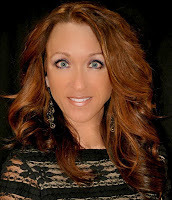 Sheri Larsen, as many of you know, is a fantastic blogger and all around incredible person. She's generous and thoughtful, and so of course, when she decided to celebrate getting an agent, she wanted to spread the joy.
Sheri Larsen, as many of you know, is a fantastic blogger and all around incredible person. She's generous and thoughtful, and so of course, when she decided to celebrate getting an agent, she wanted to spread the joy.
So, first, before we kick off this whole festival of awesome, let's take a moment to congratulate Sheri! *throws confetti at Sheri* She recently accepted an offer of representation from Paula Munier of Talcott Notch Literary.
And now, let's talk about what she's put together. It's pretty phenomenal. Here's what she has to say about it:
"Because our literary community is so freaking fabulous and generous, I'm having a Bigger-Than-A Shopping-Mall GIVEAWAY!! The giveaway consists of: two separate Rafflecopters with multiple giveaways and one grand prize Rafflecopter giveaway - to enter for the grand prize, you must enter either giveaway #1, #2, or both.
The giveaway is open until September 27th. WINNERS will be announced on September 28th. (Entrants may win more than one prize!)
Thank you so much for entering, spreading the word, and celebrating with me!!"
 There are dozens of cool people participating in this giveaway. I've contributed two of the prizes:A signed copy of SANCTUMA critique of the first three chapters of your WIPAnd there are sooooo many other critiques and swaggy/booky awesome prizes. You should enter now. And spread the word. And congratulate Sheri on taking this wonderful step in her writing career! List of Rocking Participants: Lenny Lee, Colene Murphy, LM Preston, Darby Karchut, Joanne Brothwell, Patti Larsen, Christine Fonseca,Catherine Stine, Jessica Bell, Kelly Hashway, Leigh Moore, Christine Danek, Alex Cavanaugh, Katie Mills, Matthew MacNish, Beverly McClure,Marcy Hatch, Jennifer Million, Nicole Zoltack, Christina Lee, Kris Yankee, JL Spelbring, Sharon Mayhew, Candice Granger, Dianne Salerni, Lisa & Laura Roecker, Elana Johnson, Angela Ackerman & Becca Puglisi, Susan Kaye Quinn, Lydia Kang, Julie Musil, Natalie Agurrie, Talli Roland,Medeia Sharif, Kelly Polark, Angela Brown, Sarah Fine, Stina Lindenblatt, Lynda Young, Susan Fields, PK Hrezo, Shannon O'Donnell, Shelli Johannes-Wells, Theresa Brown Milstein.
There are dozens of cool people participating in this giveaway. I've contributed two of the prizes:A signed copy of SANCTUMA critique of the first three chapters of your WIPAnd there are sooooo many other critiques and swaggy/booky awesome prizes. You should enter now. And spread the word. And congratulate Sheri on taking this wonderful step in her writing career! List of Rocking Participants: Lenny Lee, Colene Murphy, LM Preston, Darby Karchut, Joanne Brothwell, Patti Larsen, Christine Fonseca,Catherine Stine, Jessica Bell, Kelly Hashway, Leigh Moore, Christine Danek, Alex Cavanaugh, Katie Mills, Matthew MacNish, Beverly McClure,Marcy Hatch, Jennifer Million, Nicole Zoltack, Christina Lee, Kris Yankee, JL Spelbring, Sharon Mayhew, Candice Granger, Dianne Salerni, Lisa & Laura Roecker, Elana Johnson, Angela Ackerman & Becca Puglisi, Susan Kaye Quinn, Lydia Kang, Julie Musil, Natalie Agurrie, Talli Roland,Medeia Sharif, Kelly Polark, Angela Brown, Sarah Fine, Stina Lindenblatt, Lynda Young, Susan Fields, PK Hrezo, Shannon O'Donnell, Shelli Johannes-Wells, Theresa Brown Milstein.
Giveaway #1: A plethora of critique opportunities ...a Rafflecopter giveaway
Giveaway #2: A ton of bookly goodies ...a Rafflecopter giveaway
Grand Prize: An in-depth consultation!a Rafflecopter giveaway
 Sheri Larsen, as many of you know, is a fantastic blogger and all around incredible person. She's generous and thoughtful, and so of course, when she decided to celebrate getting an agent, she wanted to spread the joy.
Sheri Larsen, as many of you know, is a fantastic blogger and all around incredible person. She's generous and thoughtful, and so of course, when she decided to celebrate getting an agent, she wanted to spread the joy.So, first, before we kick off this whole festival of awesome, let's take a moment to congratulate Sheri! *throws confetti at Sheri* She recently accepted an offer of representation from Paula Munier of Talcott Notch Literary.
And now, let's talk about what she's put together. It's pretty phenomenal. Here's what she has to say about it:
"Because our literary community is so freaking fabulous and generous, I'm having a Bigger-Than-A Shopping-Mall GIVEAWAY!! The giveaway consists of: two separate Rafflecopters with multiple giveaways and one grand prize Rafflecopter giveaway - to enter for the grand prize, you must enter either giveaway #1, #2, or both.
The giveaway is open until September 27th. WINNERS will be announced on September 28th. (Entrants may win more than one prize!)
Thank you so much for entering, spreading the word, and celebrating with me!!"
 There are dozens of cool people participating in this giveaway. I've contributed two of the prizes:A signed copy of SANCTUMA critique of the first three chapters of your WIPAnd there are sooooo many other critiques and swaggy/booky awesome prizes. You should enter now. And spread the word. And congratulate Sheri on taking this wonderful step in her writing career! List of Rocking Participants: Lenny Lee, Colene Murphy, LM Preston, Darby Karchut, Joanne Brothwell, Patti Larsen, Christine Fonseca,Catherine Stine, Jessica Bell, Kelly Hashway, Leigh Moore, Christine Danek, Alex Cavanaugh, Katie Mills, Matthew MacNish, Beverly McClure,Marcy Hatch, Jennifer Million, Nicole Zoltack, Christina Lee, Kris Yankee, JL Spelbring, Sharon Mayhew, Candice Granger, Dianne Salerni, Lisa & Laura Roecker, Elana Johnson, Angela Ackerman & Becca Puglisi, Susan Kaye Quinn, Lydia Kang, Julie Musil, Natalie Agurrie, Talli Roland,Medeia Sharif, Kelly Polark, Angela Brown, Sarah Fine, Stina Lindenblatt, Lynda Young, Susan Fields, PK Hrezo, Shannon O'Donnell, Shelli Johannes-Wells, Theresa Brown Milstein.
There are dozens of cool people participating in this giveaway. I've contributed two of the prizes:A signed copy of SANCTUMA critique of the first three chapters of your WIPAnd there are sooooo many other critiques and swaggy/booky awesome prizes. You should enter now. And spread the word. And congratulate Sheri on taking this wonderful step in her writing career! List of Rocking Participants: Lenny Lee, Colene Murphy, LM Preston, Darby Karchut, Joanne Brothwell, Patti Larsen, Christine Fonseca,Catherine Stine, Jessica Bell, Kelly Hashway, Leigh Moore, Christine Danek, Alex Cavanaugh, Katie Mills, Matthew MacNish, Beverly McClure,Marcy Hatch, Jennifer Million, Nicole Zoltack, Christina Lee, Kris Yankee, JL Spelbring, Sharon Mayhew, Candice Granger, Dianne Salerni, Lisa & Laura Roecker, Elana Johnson, Angela Ackerman & Becca Puglisi, Susan Kaye Quinn, Lydia Kang, Julie Musil, Natalie Agurrie, Talli Roland,Medeia Sharif, Kelly Polark, Angela Brown, Sarah Fine, Stina Lindenblatt, Lynda Young, Susan Fields, PK Hrezo, Shannon O'Donnell, Shelli Johannes-Wells, Theresa Brown Milstein.Giveaway #1: A plethora of critique opportunities ...a Rafflecopter giveaway
Giveaway #2: A ton of bookly goodies ...a Rafflecopter giveaway
Grand Prize: An in-depth consultation!a Rafflecopter giveaway
Published on September 10, 2012 03:37
September 3, 2012
RECAPTURED DREAMS: Two Questions for Justine Dell
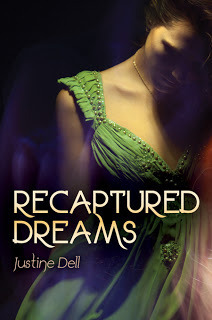 Ten years, the Atlantic Ocean, and several rungs in society have kept Xavier Cain from having Sophia Montel. Now twenty-seven, he’s spent his entire adult life building a fashion empire that could finally prove his worth to her family. When fate reunites him with Sophia at London’s premiere fashion show, one problem lodges in Xavier’s path: Sophia doesn’t remember him.
Ten years, the Atlantic Ocean, and several rungs in society have kept Xavier Cain from having Sophia Montel. Now twenty-seven, he’s spent his entire adult life building a fashion empire that could finally prove his worth to her family. When fate reunites him with Sophia at London’s premiere fashion show, one problem lodges in Xavier’s path: Sophia doesn’t remember him.The only obstacle that has kept Sophia from Xavier is a horrific car crash that erased her memory at seventeen. She’s spent the last ten years fighting to reclaim a sliver of her past that her mother refuses to help her remember. When Sophia meets Xavier at the London show, however, all her fantasies come to life in one night of passion. Discovering he is the missing link, she is determined to find all the pieces to their love story and her memory.
Xavier wants forever. Sophia wants her memory. If they take this chance, they’ll have to start over. How far are they willing to go get what they want? And when the past catches up to them, can they handle the truths it has hidden?
As I mentioned Friday, Justine was my very first crit partner. We discovered each other in early 2010 on Nathan Bransford's forums. She has spent hundreds of hours reading and critiquing my work, and has unquestionably made it better. Of course, I've also read hers, and I can tell you that Recaptured Dreams has always been a favorite of mine. I read (and write!) adult romance, so this was right up my alley. I asked Justine a few questions about her book, which comes out in two weeks:
In Recaptured Dreams, the clothes Xavier designs have an effect on Sophia's mood whenever she puts them on, even though she doesn't have any memories of him. How did you come up with that idea?
The idea of this story revolves around two people who shared similarities and passions when they were young. Strong ones. One of those passions was fashion. During the ten years the characters were apart, Xavier hoped he could find and draw Sophia back to him using his clothes. Since their connection was so strong when they were teenagers, it seemed fitting to make the items Xavier designed effect Sophia's mood and personality every time she slipped on one of his creations.
We've known each other for awhile, and you've told me many times that you enjoy writing stories in which two people with a shared past reconnect in the present. But in this story, one of the characters doesn't actually remember that shared past. Can you talk a little about how you found a balance between rekindling an old romance and creating a new one in this story?
Like you said, one of my favorite things to do is reconnect people who have a past. As age people and grow, they sometimes realize relationships they used to have might be what they should have had all along; they just didn't see it. What didn't work in the past could work in the future sort-of-thing. In this book's case, Xavier's attraction and connection is so powerful, it actually draws Sophia back to him, so to speak. It was his connection I was able to build off of. And because his presence ignited little flickers of Sophia's long-forgotten past, it was like weaving together the perfect should-have-been. There wasn't a new connection to develop because, from the get-go, Sophia has an attraction, a draw to Xavier that she can't explain. I was able to build off both the characters in their separate ways, still focusing a great deal on what used to be and bringing the story forward to the what-can-be-now.
Okay! Thank you, Justine! To my fellow adult romance readers: doesn't that make you want to read the book? You can! You can pre-order at B&N, and it will be available on Amazon and Omnific on September 18th.
A bit more about Justine:
 Justine lives in the Midwest, happily catering to her family, which consists of a horse-obsessed teenage daughter and four crazy dogs. She’s never moved from her hometown, but hopes to grow old in a much warmer climate.
Justine lives in the Midwest, happily catering to her family, which consists of a horse-obsessed teenage daughter and four crazy dogs. She’s never moved from her hometown, but hopes to grow old in a much warmer climate. During the day she works a normal job with college students who try their best to keep her young. They’ve done a good job thus far. At night, said teenage daughter and her horse require mounds of love and attention. The weekends belong solely to her and her writing. That’s when she morphs into a sticky bug, unable to leave the confines of her computer chair. She started writing three years ago after seeing a movie that set off a chain reaction she couldn’t have stopped if she’d wanted. It’s not a hobby for her; it’s an obsession. One she loves and one she loves to share.
Here's where to find Justine: Contact Justine by email: dell.justine@gmail.com
Recaptured Dreams on Goodreads. And there's a giveaway going on right now--you can enter here.
Recaptured Dreams on Facebook.
Friend her on Facebook
Check out her Blog. She's hosting a huge giveaway throughout the month of September with lots of cool stuff, including a copy of Recaptured Dreams ...or maybe a signed hardcover of Sanctum!
Find her on Twitter.
ONE MORE THING: Justine will be giving away a copy of the ebook TODAY to one of my commenters!
Published on September 03, 2012 03:53
August 29, 2012
Conquering Writer's Block VI: "Writer's block doesn't exist."
We have reached the final post in this series! I know many of these posts were long, but it was my sincere hope to create a resource for writers experiencing the frustration of writer's block. To recap:
Part I: The basic (cognitive-behavioral) model. Helps you understand where I'm coming from.
Part II: The three flavors of writer's block (based on an informal poll of writers).
Part III: First flavor: When life gets in the way. A process for determining how to take EFFECTIVE action against writer's block.
Part IV: Second flavor: Brain clog. What to do when your brain is stuck on the hamster wheel.
Part V: Third flavor: The cycle of doom (AKA: avoidance).
And today, I want to tell you how I think about a statement I've seen in many places, from many writers:
"WRITER'S BLOCK DOESN'T EXIST."
I've seen established professional writers say this, usually in the context of explaining that writing is a full-time job for them, and they simply can't afford to not do it. I've seen not-yet-established writers say this, as well. When I asked about writer's block over at the AbsoluteWrite forums, the folks there urged me to include this particular saying in my discussion of this topic, because many of them had been told "writer's block doesn't exist" ... while in the midst of a bout of writer's block.
On the one hand, I think, frankly, that this is a crappy thing to say to someone experiencing writer's block. If someone tells you that he/she is depressed, are you really going to respond with, "Oh, hey. Depression doesn't exist. Pick yourself up by your bootstraps and cheer up, dude." That would make you ... well, insensitive would be a polite way of putting it.
Basically, if you say this to someone who is dealing with the very problem you're claiming doesn't exist, you are telling them that their experience of the world is invalid.
On the other hand ... I totally get what the "writer's block doesn't exist" crowd is saying, and I would like to offer a positive reframe to the rest of you. I have never seen a case where someone made that statement with malice on his/her mind. Rather, it's often made with helpful intentions. Unfortunately, saying it in that invalidating way makes it highly likely that those good intentions will fall flat, but that is a pitfall of being human instead of a robot. We communicate imperfectly.
Here's the reframe: "writer's block doesn't exist" ---------> "you can do something about writer's block. You are not helpless against it."
"Writer's block doesn't exist" is based on the assumption that, when someone says she has it, she believes she can't do anything about it. That assumption is sometimes correct. It's easy to feel helpless against something that is often nebulous and hard to figure out (which is why I did this series!) and blocks us from achieving deeply valued goals.
But the assumption that you can't do anything about writer's block? 100% INCORRECT.
And this is why some people say "writer's block doesn't exist." Really, they're saying you can do something about writer's block.
They're right.
Dismissing a problem as nonexistent is really not a helpful way of dealing with things, for so many reasons. But the belief that one can deal with the problem? Very helpful. Very accurate.
That's the point of this entire series. You can figure out what's behind your writer's block, and you can do something about it. That something will be more effective if you take the time to puzzle out what's going on and design strategies targeted at that cause (rather than embracing a bunch of tips immediately). There are awesome tips out there. Lots of resources. But if you don't understand the source of your particular writer's block, they might lead you in the wrong direction.
Know thyself, and then choose thy tips wisely.
Let me know if you have any questions, folks. Thanks for hanging in there with me throughout this series. I hope it's been helpful.
On Monday, when I'll be featuring Justine Dell here on the blog. Her romance, Recaptured Dreams, will be published in a few days by Omnific Publishing, and she'll be here to answer a few questions about the book. Justine was my VERY first crit partner. She and I stumbled our way through the early days, teaching each other. SO I hope you'll come back on Monday and celebrate her achievements with me!
Part I: The basic (cognitive-behavioral) model. Helps you understand where I'm coming from.
Part II: The three flavors of writer's block (based on an informal poll of writers).
Part III: First flavor: When life gets in the way. A process for determining how to take EFFECTIVE action against writer's block.
Part IV: Second flavor: Brain clog. What to do when your brain is stuck on the hamster wheel.
Part V: Third flavor: The cycle of doom (AKA: avoidance).
And today, I want to tell you how I think about a statement I've seen in many places, from many writers:
"WRITER'S BLOCK DOESN'T EXIST."
I've seen established professional writers say this, usually in the context of explaining that writing is a full-time job for them, and they simply can't afford to not do it. I've seen not-yet-established writers say this, as well. When I asked about writer's block over at the AbsoluteWrite forums, the folks there urged me to include this particular saying in my discussion of this topic, because many of them had been told "writer's block doesn't exist" ... while in the midst of a bout of writer's block.
On the one hand, I think, frankly, that this is a crappy thing to say to someone experiencing writer's block. If someone tells you that he/she is depressed, are you really going to respond with, "Oh, hey. Depression doesn't exist. Pick yourself up by your bootstraps and cheer up, dude." That would make you ... well, insensitive would be a polite way of putting it.
Basically, if you say this to someone who is dealing with the very problem you're claiming doesn't exist, you are telling them that their experience of the world is invalid.
On the other hand ... I totally get what the "writer's block doesn't exist" crowd is saying, and I would like to offer a positive reframe to the rest of you. I have never seen a case where someone made that statement with malice on his/her mind. Rather, it's often made with helpful intentions. Unfortunately, saying it in that invalidating way makes it highly likely that those good intentions will fall flat, but that is a pitfall of being human instead of a robot. We communicate imperfectly.
Here's the reframe: "writer's block doesn't exist" ---------> "you can do something about writer's block. You are not helpless against it."
"Writer's block doesn't exist" is based on the assumption that, when someone says she has it, she believes she can't do anything about it. That assumption is sometimes correct. It's easy to feel helpless against something that is often nebulous and hard to figure out (which is why I did this series!) and blocks us from achieving deeply valued goals.
But the assumption that you can't do anything about writer's block? 100% INCORRECT.
And this is why some people say "writer's block doesn't exist." Really, they're saying you can do something about writer's block.
They're right.
Dismissing a problem as nonexistent is really not a helpful way of dealing with things, for so many reasons. But the belief that one can deal with the problem? Very helpful. Very accurate.
That's the point of this entire series. You can figure out what's behind your writer's block, and you can do something about it. That something will be more effective if you take the time to puzzle out what's going on and design strategies targeted at that cause (rather than embracing a bunch of tips immediately). There are awesome tips out there. Lots of resources. But if you don't understand the source of your particular writer's block, they might lead you in the wrong direction.
Know thyself, and then choose thy tips wisely.
Let me know if you have any questions, folks. Thanks for hanging in there with me throughout this series. I hope it's been helpful.
On Monday, when I'll be featuring Justine Dell here on the blog. Her romance, Recaptured Dreams, will be published in a few days by Omnific Publishing, and she'll be here to answer a few questions about the book. Justine was my VERY first crit partner. She and I stumbled our way through the early days, teaching each other. SO I hope you'll come back on Monday and celebrate her achievements with me!
Published on August 29, 2012 03:15
August 27, 2012
Conquering Writer's Block V: THE CYCLE OF DOOM
Whoa. I have never done a blog series this long. For those of you who are just tuning in, here's what we've done so far:
Part I: The basic (cognitive-behavioral) model. Helps you understand where I'm coming from.
Part II: The three flavors of writer's block (based on an informal poll of writers).
Part III: First flavor: When life gets in the way. A process for determining how to take EFFECTIVE action against writer's block.
Part IV: Second flavor: Brain clog. What to do when your brain is stuck on the hamster wheel.
And today ... today we talk about something powerful and fascinating. Many, many writers I polled (and commenters since this series has begun), have indicated that one of the primary drivers of their writer's block seems to be avoidance. There are myriad thoughts that could lead a writer to develop this type of block, but some examples are:
Not wanting to write a particular scene for whatever reason (not fun, emotionally draining, etc.)Being REALLY aware of how far you have to go before you finish the book.Knowing you have to go back and rewrite huge swaths of story to get it right.Thinking about how likely it is that you will "fail" (however you define that--not getting an agent, not getting traditionally published, not getting positive feedback)Thinking that you're not very good at this whole writing thing ... so why bother.All those thoughts can cause intense internal squirminess. THIS IS THE CYCLE OF DOOM (start at the bottom with "You sit down to write":
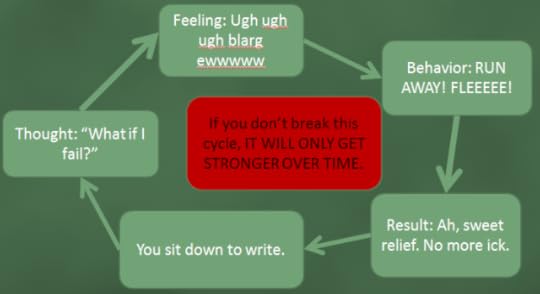
Does this look familiar to you? If you think about it, you can probably substitute A LOT of things for "you sit down to write." Avoidance is a powerful and fairly universal behavioral process. The feeling of relief when we avoid something that makes us feel yucky is called "negative reinforcement." You've probably heard of "negative reinforcement" before, but I have to tell you, most people don't know what it really means. But now you know! It STRENGTHENS a behavior by removing something that feels bad.
In this case, it's the process of sitting down to write that feels bad, because it is associated with those uuuuuuuggggghhhhh thoughts.
Would you like to know what strengthens avoidance more than anything else? Would you like to know what will drive you into a deep, deeeeeep bout of writer's block?
Um, avoidance. Avoidance leads to more avoidance. The more you avoid, the more you avoid. Yeah.
This is how anxiety disorders are maintained, too, if you're wondering. Panic attacks, for example. Obsessive-compulsive behaviors as well. And the most effective treatment for them is the same:
Exposure. For anxiety disorders, cognitive behavioral therapy that includes an exposure component is considered a first line treatment. YES--not medication. Not simple talk therapy. Not visualization or deep breathing alone. Facing one's fears is effective if it's done the right way.
Exposure is the opposite of avoidance. And pretty much the only thing that can defeat it.
Exposure is not fun. We avoid stuff for a reason, right? BECAUSE IT FEELS BAD! Exposure involves sitting with whatever makes us feel that way and not running away from it. Not distracting ourselves from it. In other words, you have to ...
FEEL THE ICK.
It might look something like this:
 Or, hopefully, this:
Or, hopefully, this:

When you're dealing with the avoidance flavor of writer's block, there is only one way through it, and that's ... to go through it. To confront it head-on. That DOES NOT mean you ignore the thoughts that are making you avoid. It means the opposite! You have to acknowledge the thoughts, feel the feelings, and write anyway.
BICHOK, of course, means: Butt In Chair, Hands On Keyboard.
Typing your way through a block is not the solution to all types of writer's block, but if you've contracted a severe case of avoidance, it's really the only way through.
A few caveats, though!
Don't set yourself up to fail. This is actually one of the biggest mistakes I see when people decide to change. They set BIG goals because that's what they want to achieve. But successful change plans always do a few things:
Set the bar LOW. Start where you can succeed for sure. A chapter feels overwhelming? Start with a page. Is that too much? It's okay! Start with a paragraph! Still too much? No problem. Start with a sentence. Yeah, I'm serious. Early success is key to a successful change plan. Overambitious plans fail. I've seen it over and over again.
Reward, reward, reward. But make it small and manageable. Something you like to do every day. Don't go for a long-term reward at first. Don't do something like "if I write 20k words by the end of this week, I'll take myself out to dinner and a movie." It's too easy to fail early and give up completely. Instead, do something like, "I will write this paragraph, and then I will allow myself five minutes on Twitter" or whatever the small, daily (or hourly) reward is.
Rinse, repeat. You have to do this over and over again. Until you can sit there and think, "yes, I have a long way to go, and that feels UGH, but each step brings me closer to my goal." When you can do that, your writer's block will most likely will be gone.
Do not condemn yourself for failure. If you mess up once, you can't throw up your hands and say, "Oh, I might as well go back to my old avoidance habits." You have to shake that off and keep engaging with the ICK. Otherwise it will eat your brain. Really.
BUT--though you shouldn't be too hard on yourself, you also shouldn't set yourself up for it, as I said. Please trust me when I tell you to start out easy and move on from there (I'm serious--this is where I live professionally. I do know what I'm talking about). Remember that avoidance breeds avoidance, so if you make it too hard and end up avoiding to cope ... you've just made your problem BIGGER.
And that's it! Please let me know if you have questions about how to deal with the avoidance flavor (mmmm... bitter!) of writer's block.
On Wednesday, I'll tell you what I think of the phrase "Writer's block doesn't exist."
Part I: The basic (cognitive-behavioral) model. Helps you understand where I'm coming from.
Part II: The three flavors of writer's block (based on an informal poll of writers).
Part III: First flavor: When life gets in the way. A process for determining how to take EFFECTIVE action against writer's block.
Part IV: Second flavor: Brain clog. What to do when your brain is stuck on the hamster wheel.
And today ... today we talk about something powerful and fascinating. Many, many writers I polled (and commenters since this series has begun), have indicated that one of the primary drivers of their writer's block seems to be avoidance. There are myriad thoughts that could lead a writer to develop this type of block, but some examples are:
Not wanting to write a particular scene for whatever reason (not fun, emotionally draining, etc.)Being REALLY aware of how far you have to go before you finish the book.Knowing you have to go back and rewrite huge swaths of story to get it right.Thinking about how likely it is that you will "fail" (however you define that--not getting an agent, not getting traditionally published, not getting positive feedback)Thinking that you're not very good at this whole writing thing ... so why bother.All those thoughts can cause intense internal squirminess. THIS IS THE CYCLE OF DOOM (start at the bottom with "You sit down to write":

Does this look familiar to you? If you think about it, you can probably substitute A LOT of things for "you sit down to write." Avoidance is a powerful and fairly universal behavioral process. The feeling of relief when we avoid something that makes us feel yucky is called "negative reinforcement." You've probably heard of "negative reinforcement" before, but I have to tell you, most people don't know what it really means. But now you know! It STRENGTHENS a behavior by removing something that feels bad.
In this case, it's the process of sitting down to write that feels bad, because it is associated with those uuuuuuuggggghhhhh thoughts.
Would you like to know what strengthens avoidance more than anything else? Would you like to know what will drive you into a deep, deeeeeep bout of writer's block?
Um, avoidance. Avoidance leads to more avoidance. The more you avoid, the more you avoid. Yeah.
This is how anxiety disorders are maintained, too, if you're wondering. Panic attacks, for example. Obsessive-compulsive behaviors as well. And the most effective treatment for them is the same:
Exposure. For anxiety disorders, cognitive behavioral therapy that includes an exposure component is considered a first line treatment. YES--not medication. Not simple talk therapy. Not visualization or deep breathing alone. Facing one's fears is effective if it's done the right way.
Exposure is the opposite of avoidance. And pretty much the only thing that can defeat it.
Exposure is not fun. We avoid stuff for a reason, right? BECAUSE IT FEELS BAD! Exposure involves sitting with whatever makes us feel that way and not running away from it. Not distracting ourselves from it. In other words, you have to ...
FEEL THE ICK.
It might look something like this:
 Or, hopefully, this:
Or, hopefully, this:
When you're dealing with the avoidance flavor of writer's block, there is only one way through it, and that's ... to go through it. To confront it head-on. That DOES NOT mean you ignore the thoughts that are making you avoid. It means the opposite! You have to acknowledge the thoughts, feel the feelings, and write anyway.
BICHOK, of course, means: Butt In Chair, Hands On Keyboard.
Typing your way through a block is not the solution to all types of writer's block, but if you've contracted a severe case of avoidance, it's really the only way through.
A few caveats, though!
Don't set yourself up to fail. This is actually one of the biggest mistakes I see when people decide to change. They set BIG goals because that's what they want to achieve. But successful change plans always do a few things:
Set the bar LOW. Start where you can succeed for sure. A chapter feels overwhelming? Start with a page. Is that too much? It's okay! Start with a paragraph! Still too much? No problem. Start with a sentence. Yeah, I'm serious. Early success is key to a successful change plan. Overambitious plans fail. I've seen it over and over again.
Reward, reward, reward. But make it small and manageable. Something you like to do every day. Don't go for a long-term reward at first. Don't do something like "if I write 20k words by the end of this week, I'll take myself out to dinner and a movie." It's too easy to fail early and give up completely. Instead, do something like, "I will write this paragraph, and then I will allow myself five minutes on Twitter" or whatever the small, daily (or hourly) reward is.
Rinse, repeat. You have to do this over and over again. Until you can sit there and think, "yes, I have a long way to go, and that feels UGH, but each step brings me closer to my goal." When you can do that, your writer's block will most likely will be gone.
Do not condemn yourself for failure. If you mess up once, you can't throw up your hands and say, "Oh, I might as well go back to my old avoidance habits." You have to shake that off and keep engaging with the ICK. Otherwise it will eat your brain. Really.
BUT--though you shouldn't be too hard on yourself, you also shouldn't set yourself up for it, as I said. Please trust me when I tell you to start out easy and move on from there (I'm serious--this is where I live professionally. I do know what I'm talking about). Remember that avoidance breeds avoidance, so if you make it too hard and end up avoiding to cope ... you've just made your problem BIGGER.
And that's it! Please let me know if you have questions about how to deal with the avoidance flavor (mmmm... bitter!) of writer's block.
On Wednesday, I'll tell you what I think of the phrase "Writer's block doesn't exist."
Published on August 27, 2012 03:24
August 24, 2012
Conquering Writer's Block IV: BRAIN CLOG
Today I'll continue my series on conquering writer's block. The other posts are here (introducing the model), here (going over the "flavors"), and here (about how to dissect the "when life gets in the way" flavor of writer's block). And now we get to ... BRAIN CLOG. Writers have to accomplish a lot of different stuff. In addition to writing all the words, we have to craft a clever plot that surprises and engages the reader. That's kind of difficult sometimes, and it's natural to get stuck. On a scene, a plot twist, a character motivation ... A LOT of writers told me that this kind of stalls them out sometimes Many of the tips I see for writers are things like "just write!" or some variation on that. BUT--if you've got the BC flavor of writer's block, "just write!" isn't likely to work as well for you. It could result in an intensification of your frustration and stuckness. I would know. One of my big problems, actually, is that, when I get stuck, my brain goes into this mode:

I worry at that problem until I can't see straight. I dream about it. It is all I think about while I commute. And as I do, I get more ... and more ... and more ... well, crazypants, for lack of a better term. But no closer to solving my problem. You know the only thing that ends up relieving this kind of STUCKness?
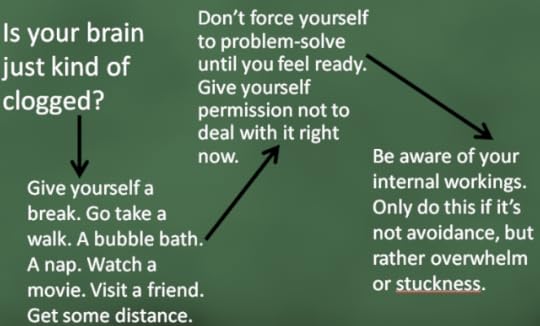
So really, you have to get off the hamster wheel. If you're on overwhelm, if you're just stuck, it's actually best to step away for a little while and think of other things. How many of you have come to a solution while thinking about something completely different? Your brain is amazing. Let it do its work. And, failing that, get another perspective! Talk to one of your critique partners. Don't argue, and don't decide pre-emptively whether or not the suggestions will work. Just let them sit for a while.
Now ... if you do this, if you step away and give your brain permission to wander, you have to be aware of when/if that wandering turns in to avoidance. It can happen. Think of your thoughts as green fruit, gradually ripening as you let them sit in the sunlight. If you stay away too long, the risk of them going rotten and turning into something gross that you'd pretty much do anything to avoid cleaning up ... gets higher by the day.
Which is why, on Monday, we shall talk about a little something called AVOIDANCE. Otherwise known as: THE CYCLE OF DOOM.
Until then, my friends, have an excellent weekend!

I worry at that problem until I can't see straight. I dream about it. It is all I think about while I commute. And as I do, I get more ... and more ... and more ... well, crazypants, for lack of a better term. But no closer to solving my problem. You know the only thing that ends up relieving this kind of STUCKness?

So really, you have to get off the hamster wheel. If you're on overwhelm, if you're just stuck, it's actually best to step away for a little while and think of other things. How many of you have come to a solution while thinking about something completely different? Your brain is amazing. Let it do its work. And, failing that, get another perspective! Talk to one of your critique partners. Don't argue, and don't decide pre-emptively whether or not the suggestions will work. Just let them sit for a while.
Now ... if you do this, if you step away and give your brain permission to wander, you have to be aware of when/if that wandering turns in to avoidance. It can happen. Think of your thoughts as green fruit, gradually ripening as you let them sit in the sunlight. If you stay away too long, the risk of them going rotten and turning into something gross that you'd pretty much do anything to avoid cleaning up ... gets higher by the day.
Which is why, on Monday, we shall talk about a little something called AVOIDANCE. Otherwise known as: THE CYCLE OF DOOM.
Until then, my friends, have an excellent weekend!
Published on August 24, 2012 03:23
August 22, 2012
Conquering Writer's Block III: When life gets in the way.
My previous posts on writer's block, wherein I introduce the model and then discuss the various "flavors" (based on a completely unscientific poll) are here and here, respectively.
If you read Monday's post, you'll recall that I said I was going to discuss the first two flavors today, but then I realized there was just too much to tell you, so I'm going to do a post on the second flavor (brain clog) on Friday, and I'll focus on only the first (broader life/mental health issues) today.
Now, it would be kind of flip of me to say to you: "If it's broader life/mental health issues, just go deal with those and come back when you're done. Then your writer's block will be gone!"
I would suck if I said that. It doesn't work like that. Sure, there are transient life situations, like moving apartments, or starting college or a new job, or having any kind of illness that is treatable and goes away. Sometimes you can just wait things out. But if there's something chronic, if you are a typical adolescent or grown-up who is juggling multiple roles ... telling you to go "deal with that" so you can get back to writing is pretty laughable. It's far more complex than that. You do have to deal with it, though. Every day. But it's probably more of a management process than a "clear the decks so everything else is perfect" thing.
Now, if you think you might have a clinical issue, like depression or anxiety, that is affecting your ability to write, it's worth taking a look at. I won't go into too much depth here, but I would say that it would be worth it to consult with a competent professional to see if you can get treatment to improve your ability to manage those symptoms across settings and situations.
But as for the other "chronic life stuff" issues ... you'll get back on track quicker if you take the time to figure it out and sort it out. On Monday I responded to a comment by Lydia Sharp, soon-to-be-published author and blogger extraordinaire. She basically asked what to do when there are multiple life-and-other-stuff causes for writer's block . It reminded me that ... this is usually the case, actually. I responded to that comment with a (kinda long) comment of my own, which I present again today. Only with pictures. And no spelling errors.
[By the way? This? This is how I work with clients. No magic--just systematic approaches to complex problems...]
If you were to come to me and say, "Help! I haven't written a page in over a month!" ...
I'd sit down with you and map out the problem. We'd put the writer's block in the middle (like in the diagram I presented on Monday), but I'd make it specific to YOU. Like, whatever you as a writer are having trouble doing (e.g., getting a certain amount done, failing to make time in the busy schedule for writing, or whatever it is--and if there's more than one thing, we'd do this for each one).
Then we'd build a model of what's causing the block, just like in that diagram. But again, for an individual person, it would be more specific. We'd think of as many causes, no matter how big or small, and write them around the problem.
Here's what one of those diagrams might look like:
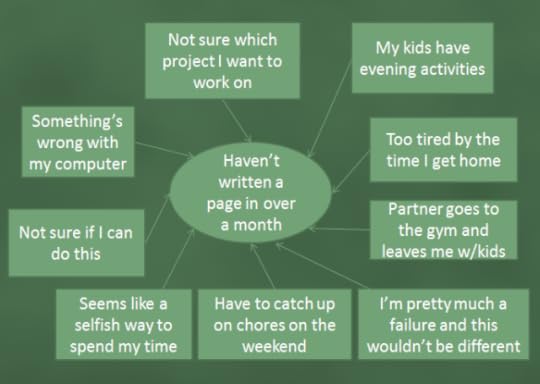
After we make our map (it might be more complex than this one), we know the things that *could* be targeted to get you writing again. We could target some of the different thoughts, or the structure of the schedule, or the supportiveness of the partner and other natural supports, etc. But there's no way we can tackle all of them at once! We have to prioritize. So we would consider a few questions:
1. Which one do YOU think would make the most difference, and which one(s) are you willing to work on? 2. Which one(s) would give us the biggest bang for our buck? Like, are there any that could have a big, quick impact or affect several writing problems (or problems in other areas of your life)?
3. Are there any practical, quick and easy fixes? We can tackle those--as long as we're also tackling more fundamental ones as well. These would be things like finding a way to get the computer fixed or finding a way around that.4. Are there any that have to be addressed before we can get to some of the other ones? 5. Are there any that have been proven to affect writer's block? (like, research shows that thinking you're a failure can really decrease mood and productivity)
6. Are there any causes that are tightly connected to the problem and happen right before the problem crops up? (again, often the thoughts)
7. Which one(s) are happening right now, as opposed to being historical causes (things that might have happened a long time ago--usually those historical events/causes give rise to the things in #6, so that's how those are addressed)?
The causes we choose to tackle wouldn't have ALL those characteristics, only one or two of them, but based on your priorities, we'd pick one or two, and then we'd develop a specific intervention to address them. What would YOU choose? Should we design an intervention to address some of those negative thoughts? Should we discuss how to restructure your schedule? Should we talk about how you can ask your partner for some mutual support?
We'd reassess frequently to see if the intervention is working, and if it's not, we'd analyze why (using the same process as above!)And ... that's it. It's not a perfect, simple process, but it organizes something that can often feel unmanageable and therefore undoable. I promise you--mapping it out instead of letting it stay big and hairy and overwhelming ... it will help you feel better and more in control. And that is an excellent first step.I'll be back on Friday to talk about BRAIN CLOG.

If you read Monday's post, you'll recall that I said I was going to discuss the first two flavors today, but then I realized there was just too much to tell you, so I'm going to do a post on the second flavor (brain clog) on Friday, and I'll focus on only the first (broader life/mental health issues) today.
Now, it would be kind of flip of me to say to you: "If it's broader life/mental health issues, just go deal with those and come back when you're done. Then your writer's block will be gone!"
I would suck if I said that. It doesn't work like that. Sure, there are transient life situations, like moving apartments, or starting college or a new job, or having any kind of illness that is treatable and goes away. Sometimes you can just wait things out. But if there's something chronic, if you are a typical adolescent or grown-up who is juggling multiple roles ... telling you to go "deal with that" so you can get back to writing is pretty laughable. It's far more complex than that. You do have to deal with it, though. Every day. But it's probably more of a management process than a "clear the decks so everything else is perfect" thing.
Now, if you think you might have a clinical issue, like depression or anxiety, that is affecting your ability to write, it's worth taking a look at. I won't go into too much depth here, but I would say that it would be worth it to consult with a competent professional to see if you can get treatment to improve your ability to manage those symptoms across settings and situations.
But as for the other "chronic life stuff" issues ... you'll get back on track quicker if you take the time to figure it out and sort it out. On Monday I responded to a comment by Lydia Sharp, soon-to-be-published author and blogger extraordinaire. She basically asked what to do when there are multiple life-and-other-stuff causes for writer's block . It reminded me that ... this is usually the case, actually. I responded to that comment with a (kinda long) comment of my own, which I present again today. Only with pictures. And no spelling errors.
[By the way? This? This is how I work with clients. No magic--just systematic approaches to complex problems...]
If you were to come to me and say, "Help! I haven't written a page in over a month!" ...
I'd sit down with you and map out the problem. We'd put the writer's block in the middle (like in the diagram I presented on Monday), but I'd make it specific to YOU. Like, whatever you as a writer are having trouble doing (e.g., getting a certain amount done, failing to make time in the busy schedule for writing, or whatever it is--and if there's more than one thing, we'd do this for each one).
Then we'd build a model of what's causing the block, just like in that diagram. But again, for an individual person, it would be more specific. We'd think of as many causes, no matter how big or small, and write them around the problem.
Here's what one of those diagrams might look like:

After we make our map (it might be more complex than this one), we know the things that *could* be targeted to get you writing again. We could target some of the different thoughts, or the structure of the schedule, or the supportiveness of the partner and other natural supports, etc. But there's no way we can tackle all of them at once! We have to prioritize. So we would consider a few questions:
1. Which one do YOU think would make the most difference, and which one(s) are you willing to work on? 2. Which one(s) would give us the biggest bang for our buck? Like, are there any that could have a big, quick impact or affect several writing problems (or problems in other areas of your life)?
3. Are there any practical, quick and easy fixes? We can tackle those--as long as we're also tackling more fundamental ones as well. These would be things like finding a way to get the computer fixed or finding a way around that.4. Are there any that have to be addressed before we can get to some of the other ones? 5. Are there any that have been proven to affect writer's block? (like, research shows that thinking you're a failure can really decrease mood and productivity)
6. Are there any causes that are tightly connected to the problem and happen right before the problem crops up? (again, often the thoughts)
7. Which one(s) are happening right now, as opposed to being historical causes (things that might have happened a long time ago--usually those historical events/causes give rise to the things in #6, so that's how those are addressed)?
The causes we choose to tackle wouldn't have ALL those characteristics, only one or two of them, but based on your priorities, we'd pick one or two, and then we'd develop a specific intervention to address them. What would YOU choose? Should we design an intervention to address some of those negative thoughts? Should we discuss how to restructure your schedule? Should we talk about how you can ask your partner for some mutual support?
We'd reassess frequently to see if the intervention is working, and if it's not, we'd analyze why (using the same process as above!)And ... that's it. It's not a perfect, simple process, but it organizes something that can often feel unmanageable and therefore undoable. I promise you--mapping it out instead of letting it stay big and hairy and overwhelming ... it will help you feel better and more in control. And that is an excellent first step.I'll be back on Friday to talk about BRAIN CLOG.
Published on August 22, 2012 03:20
August 20, 2012
Conquering Writer's Block II: What Flavor Are We Talking About?
Last week, I presented the general cognitive-behavioral model that I'm using throughout this series, so if you find yourself lost in these next few posts, you might want to refer back to it.
Awhile back, I asked you guys to tell me about your experiences with writer's block, and you really came through for me. I also asked the folks over on the Absolute Write boards to share. I compiled those results and came up with this:
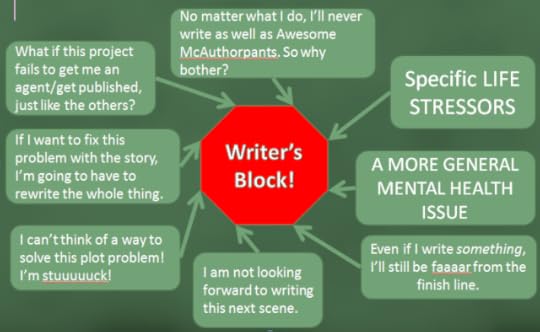
It's a summary, of course, a sampling. But I noticed a few things--the responses had a lot in common. Based on my informal poll, I'm going to suggest that writer's block seems to come in three (very)general "flavors."
Broader life/mental health issues: I read a few accounts where it really seemed like life got in the way. That makes sense, right? If you've got a lot going on (general stress, major transitions, disappointing events, intense experiences that might be good but are still draining), or if you have depression or anxiety, you might have writer's block that's more driven by those things rather than the experience of writing. Sometimes writing is a refuge--but it doesn't go unaffected by our every day experiences.
Brain clog: This is a highly technical term that basically means you're STUCK. Either it's a scene, or the plot, or how to get from point A to point B ... you're having trouble solving the problem, no matter how much you think about it!
Avoidance: A very common flavor, judging by all of your responses! Here, we're talking about sitting down to write and having an unpleasant thought (one you *might* not even know you're having, but in the diagram above, "I'll still be far from the finish line" and "I'm going to have to rewrite the whole thing" and "I'll never be as awesome as so-and-so" are examples), and it feels bad! So you ... avoid it!
And guess what? You know all those fabulous tips out there for dealing with writer's block? They won't necessarily be effective for you unless you know what flavor of writer's block you have. Because the ways you deal with each flavor are pretty different from one another!
I'll be back on Wednesday to talk about the first two flavors, and next Monday I'll talk about the third. Next Wednesday, I'll wrap up the series with a discussion of the phrase "writer's block doesn't exist." But I'm certain you've never heard anyone say that, right? ;)
Let me know if you have any questions or think I've missed a flavor!

Awhile back, I asked you guys to tell me about your experiences with writer's block, and you really came through for me. I also asked the folks over on the Absolute Write boards to share. I compiled those results and came up with this:

It's a summary, of course, a sampling. But I noticed a few things--the responses had a lot in common. Based on my informal poll, I'm going to suggest that writer's block seems to come in three (very)general "flavors."
Broader life/mental health issues: I read a few accounts where it really seemed like life got in the way. That makes sense, right? If you've got a lot going on (general stress, major transitions, disappointing events, intense experiences that might be good but are still draining), or if you have depression or anxiety, you might have writer's block that's more driven by those things rather than the experience of writing. Sometimes writing is a refuge--but it doesn't go unaffected by our every day experiences.
Brain clog: This is a highly technical term that basically means you're STUCK. Either it's a scene, or the plot, or how to get from point A to point B ... you're having trouble solving the problem, no matter how much you think about it!
Avoidance: A very common flavor, judging by all of your responses! Here, we're talking about sitting down to write and having an unpleasant thought (one you *might* not even know you're having, but in the diagram above, "I'll still be far from the finish line" and "I'm going to have to rewrite the whole thing" and "I'll never be as awesome as so-and-so" are examples), and it feels bad! So you ... avoid it!
And guess what? You know all those fabulous tips out there for dealing with writer's block? They won't necessarily be effective for you unless you know what flavor of writer's block you have. Because the ways you deal with each flavor are pretty different from one another!
I'll be back on Wednesday to talk about the first two flavors, and next Monday I'll talk about the third. Next Wednesday, I'll wrap up the series with a discussion of the phrase "writer's block doesn't exist." But I'm certain you've never heard anyone say that, right? ;)
Let me know if you have any questions or think I've missed a flavor!
Published on August 20, 2012 03:37
August 15, 2012
Conquering Writer's Block I: Know Thy Enemy.
Here we go! This post will be the first in a series on conquering writer's block.
I need you guys to understand one thing right off the bat: This is not going to be a bunch of tips.
I have nothing against tips. Really. But understand something about how I work as a psychologist: I don't treat problems. I treat the causes of problems . And that is because most problems of the human kind have multiple causes, and depending on which one (or ones) it is, the intervention might be different. I do things this way because it is more efficient and effective than using a one-size-fits-all approach to treatment.
So in these posts, I'm not going to be giving tips, really, at least not until we go over the causes of this frustrating condition, because the "tips" you choose should be tailored to the "flavor" of writer's block. That should make it easier for YOU to solve the problem of writer's block by selecting strategies that are more likely to work for you.
I hope that makes some sense.
Onward! First things first. Here's how things are not:


In other words, whatever drives your feelings--depression, anxiety, frustration, restlessness--doesn't come directly from an event (like rejection, or a negative review, or the fact that you've been trying to write the same scene for the past four weeks). Feelings come from that black box above. See it? Your thoughts. How you interpret the event.
And of course, it's not a linear process, right? Feelings aren't just an end result. Feelings drive behavior, and behavior leads to more events, and more thoughts. Like this:

Notice all those double-headed arrows? That's because each of these things affects the other stuff. This is the basic set-up for a model that we use to understand all sorts of problems. It's the foundation for a kind of treatment (cognitive-behavioral therapy) that's been proven effective in reducing symptoms of depression, anxiety, and even medication-resistant schizophrenia.
If you understand this model, you'll understand yourself better, and you'll understand writer's block better. In fact, you'll be able to deal better with a host of other obstacles to your writing or life success. So ... ponder it for a bit.
I'll be back on Monday with the results of an informal poll I took here on the blog and at the AbsoluteWrite forums about what goes through writers' heads as they experience writer's block. Basically, we're going to dissect that black box up there to start to get to the CAUSES of writer's block, so that you can determined what particular flavor you've got, and then we'll discuss what to do with each variation. Sound reasonable?
I hope so! Now--if you have questions about this model, please ask, because it's the basis for what I'll be posting on next week! I'll be answering questions in the comments so that everyone can see them.
I need you guys to understand one thing right off the bat: This is not going to be a bunch of tips.
I have nothing against tips. Really. But understand something about how I work as a psychologist: I don't treat problems. I treat the causes of problems . And that is because most problems of the human kind have multiple causes, and depending on which one (or ones) it is, the intervention might be different. I do things this way because it is more efficient and effective than using a one-size-fits-all approach to treatment.
So in these posts, I'm not going to be giving tips, really, at least not until we go over the causes of this frustrating condition, because the "tips" you choose should be tailored to the "flavor" of writer's block. That should make it easier for YOU to solve the problem of writer's block by selecting strategies that are more likely to work for you.
I hope that makes some sense.
Onward! First things first. Here's how things are not:


In other words, whatever drives your feelings--depression, anxiety, frustration, restlessness--doesn't come directly from an event (like rejection, or a negative review, or the fact that you've been trying to write the same scene for the past four weeks). Feelings come from that black box above. See it? Your thoughts. How you interpret the event.
And of course, it's not a linear process, right? Feelings aren't just an end result. Feelings drive behavior, and behavior leads to more events, and more thoughts. Like this:

Notice all those double-headed arrows? That's because each of these things affects the other stuff. This is the basic set-up for a model that we use to understand all sorts of problems. It's the foundation for a kind of treatment (cognitive-behavioral therapy) that's been proven effective in reducing symptoms of depression, anxiety, and even medication-resistant schizophrenia.
If you understand this model, you'll understand yourself better, and you'll understand writer's block better. In fact, you'll be able to deal better with a host of other obstacles to your writing or life success. So ... ponder it for a bit.
I'll be back on Monday with the results of an informal poll I took here on the blog and at the AbsoluteWrite forums about what goes through writers' heads as they experience writer's block. Basically, we're going to dissect that black box up there to start to get to the CAUSES of writer's block, so that you can determined what particular flavor you've got, and then we'll discuss what to do with each variation. Sound reasonable?
I hope so! Now--if you have questions about this model, please ask, because it's the basis for what I'll be posting on next week! I'll be answering questions in the comments so that everyone can see them.
Published on August 15, 2012 03:08



